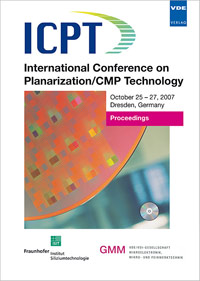Development of AE Monitoring System for CMP Process
Konferenz: ICPT 2007 - International Conference on Planarization / CMP Technology
25.10.2007 - 27.10.2007 in Dresden, Germany
Tagungsband: ICPT 2007
Seiten: 5Sprache: EnglischTyp: PDF
Persönliche VDE-Mitglieder erhalten auf diesen Artikel 10% Rabatt
Autoren:
Park, Sunjoon; Joo, Sukbae; Kim, Youngjin (Department of Precision & Mechanical Engineering. Pusan National Univercity, Jangjeon-Dong. Geumjeong-Gu, Pusan 609-735, Korea)
Jeong, Haedo (School of Mechanical Engineering, Pusan National University, Jangjeon-Dong. Geumjeong-Gu, Pusan 609-735, Korea)
Kim, Hyungjae (Precision Molds and Dies Technology Team, Korea Institute of Industrial Technology, Busan R&D Center, Korea)
Inhalt:
This paper compared wired Acoustic Emission (AE) signals with wireless AE signals. According to the materials and the process, signal characteristics were distinguishable between each materials and process. Therefore, wired and wireless AE sensors having different bandwidth is complementary for CMP process monitoring. In this paper, the AE sensor was used to investigate abrasive and molecular-scale phenomena in chemical mechanical planarization. Particularly, AE sensor was compatible to acquire high level frequency. Two types of AE sensor were installed in CMP equipment, and then, their signals were measured simultaneously during polishing process. First, wireless AE system was used to get signals in rotary system, using bluetooth. But, it is possible to acquire only RMS signals, which can not analyze abrasive and molecular-sale phenomena. Second, wired AE system using mercury slip-ring, which is suitable not only for rotation equipment but also for acquiring original signals, was installed. The acquired signals were analyzed by FFT for understanding of abrasive and molecular revel phenomena in CMP process. The authors tried to compare the results between wired and wireless AE signals. According to the material and process, signal characteristics were distinguishable. Finally, we verified that two types of AE sensor with different bandwidth were complementary for CMP process monitoring.


